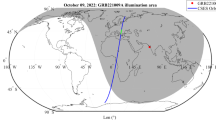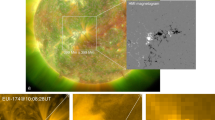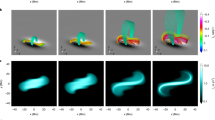Abstract
IN a letter published in NATURE of December 12, 1936, p. 1017, Mr. H. W. Newton states that in December a bright hydrogen eruption was observed at the Royal Observatory, Greenwich (beginning at 11h. 57m. U.T. and bright eruption at 12h. 03m.) and he directs attention to the fact that this eruption coincided with ” a marked abnormality in the ionosphere”.
This is a preview of subscription content, access via your institution
Access options
Subscribe to this journal
Receive 51 print issues and online access
$199.00 per year
only $3.90 per issue
Buy this article
- Purchase on Springer Link
- Instant access to full article PDF
Prices may be subject to local taxes which are calculated during checkout
Similar content being viewed by others
References
Bureau, R., ”Electricité atmosphérique et parasites atmosphériques”. Communication faite à l'Association Internationale de Magnétisme et Electricité terrestres, Assemblée d'Edimbourg Septembre 1936. Document n° 44.
” Rapport sur certains phénomènes d'évanouissements”, 1935.
Bureau, R., and Maire, J., “Anomalies Ionospheriques à début brusque”, C.R. Acad. Sci., 203, 1276 (1936).
Author information
Authors and Affiliations
Rights and permissions
About this article
Cite this article
BUREAU, R. Abnormalities of the Ionosphere and Bright Solar Eruptions. Nature 139, 110–111 (1937). https://doi.org/10.1038/139110b0
Issue Date:
DOI: https://doi.org/10.1038/139110b0
This article is cited by
-
L'enregistrement statistique des atmosphériques et l'enregistrement du champ des émetteurs radioélectriques
Annales Des Télécommunications (1946)
Comments
By submitting a comment you agree to abide by our Terms and Community Guidelines. If you find something abusive or that does not comply with our terms or guidelines please flag it as inappropriate.



